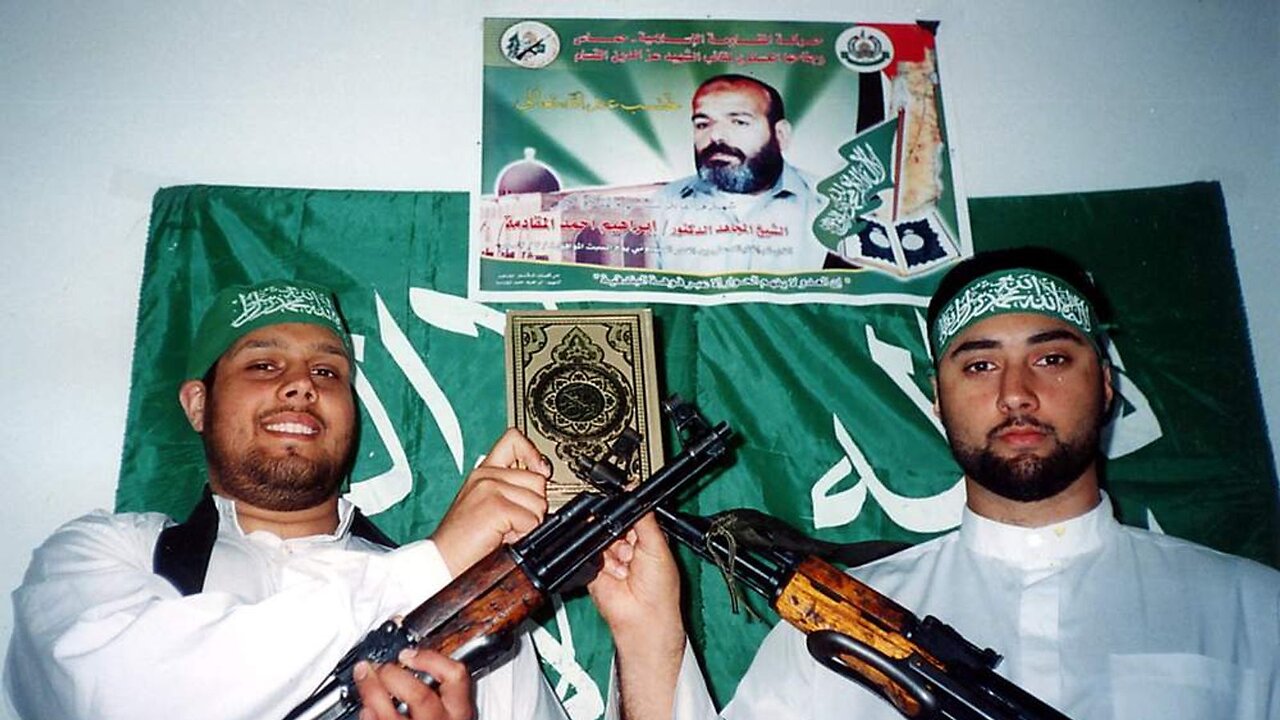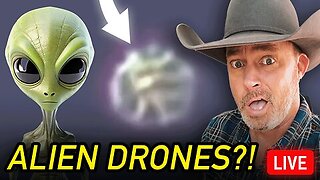Premium Only Content

Questions Over 7/7 Bomber's Trip To Israel (2015)
Back Up for:
https://news.sky.com/story/questions-over-77-bombers-trip-to-israel-10353585
Khan was in Israel weeks before two UK men bombed a Tel Aviv bar but potential links between them were not properly investigated.
By Tom Rayner, Middle East Reporter
Sunday 5 July 2015 23:32, UK
The inquests into the 2005 London bombings, presented at the time as the conclusive and final judgement on the attacks, did not examine a potentially crucial part of the lead bomber's back-story, a Sky News investigation has found.
The timing of an unexplained visit to Israel in early 2003 by lead 7/7 bomber Mohammed Sidique Khan was not addressed in any of the parliamentary or judicial investigations into the London attacks, despite the fact it occurred just weeks before two British men - with apparent connections to Khan - carried out a deadly suicide mission in Tel Aviv.
The chairman of the Home Affairs Select Committee has told Sky News he will write to the Home Secretary seeking an explanation, and has raised the question of whether "further steps" could still be necessary.
The attack on Mike's Place bar on the beach in Tel Aviv in April 2003 was carried out by Britain's first ever suicide bombers.
Asif Hanif, from Hounslow, killed three people and injured more than 50 when he detonated his device.
Another bomb carried by Omar Sharif from Derby failed to detonate. He fled the scene and his body was found washed up on the beach weeks later. A coroner's inquest ruled he had drowned.
A martyrdom video was later released by Palestinian militant group Hamas showing the two men speaking in English and Arabic.
But weeks before the attack Khan had also visited Israel for a single day in February 2003 - crossing from Jordan ostensibly for a sightseeing trip to Jerusalem.
The visit, corroborated by his absence record from his teaching assistant job at a Leeds school, and confirmed to Sky News by senior Israeli security officials, came at the end of a pilgrimage to Mecca in Saudi Arabia.
The Government's official account of 7/7, published in 2006, did mention Khan's visit to Israel but claimed there was "no evidence of anything suspicious".
However, the plausibility of this assessment is drawn into question by the fact that in its otherwise comprehensive contextual timeline of the "evolving international terrorist threat", the report misses any mention of the Mike’s Place bombing, which occurred weeks after Khan’s visit .
After 7/7, numerous indications emerged that Khan might have been an associate of Sharif and Hanif.
All three were involved in the activities of the now-banned Al Muhajiroun group, led by radical preachers Omar Bakri Mohammad and Abu Hamza.
Sources have told Sky News Sharif travelled widely, and is believed to have visited the same mosque in Beeston as Khan at one period.
Most significantly, a 2006 BBC documentary featured an interview with Manchester businessman Kursheed Fiaz, who claimed the trio had approached him in 2001 seeking funding for a project to send young British Muslims for "education in the new ways of Islam" in Syria, Pakistan and Afghanistan.
Despite the fact Khan’s visit occurred shortly before the Tel Aviv attacks, and despite the post-7/7 indications that he may have had contact with the Mike’s Place bombers, the question of whether police properly investigated the Tel Aviv attackers’ backgrounds has not been asked - either in the post-7/7 parliamentary investigations or a wide-ranging inquest, both of which looked at the background and travel history of Khan.
Joshua Faudem, a filmmaker who witnessed and survived the Mike’s Place bombing, has claimed in a recent graphic novel about the attack that he was never interviewed by British investigators, despite Israeli intelligence agents insisting they would need to speak to him.
"The end of the meeting was [the Israeli investigators] saying to me - this is their problem, this is a British problem, yes it happened here, but this is definitely a British investigation… they had my details, they said they'd passed them on - and I never heard from them, ever," he told Sky News.
Nobody has even been convicted of any offence in relation to the Tel Aviv bombing.
Delivering her closing remarks in the 2011 inquest into 7/7, Lady Justice Hallett said she believed she "had left no stone unturned" in her investigation into whether intelligence or police could have done more to identify Khan before the attacks.
She concluded that despite the fact Khan had appeared on the surveillance of various anti-terrorism operations since as early as 2001, authorities could not reasonably have been expected to have taken steps to identify him as a threat in a way that might have prevented the London attacks.
Now the solicitor who represented the majority of the families of victims of 7/7 has said he believes Khan’s visit to Israel would have been relevant to the inquest and should have formed part of the proceedings.
"If I had been aware of this information, I would certainly have asked the coroner to look at it," said Clifford Tibber, adding that he was concerned the new revelations could cause fresh anxiety and upset for the victims’ families.
Sky News understands Khan’s Israel trip was not dealt with in closed proceedings or redacted evidence during the course of the inquest.
Chairman of the Home Affairs Select Committee Keith Vaz MP has indicated he will write to Home Secretary Theresa May to suggest this subject could be raised when she appears before his committee in the coming weeks.
"It is relevant because relatives of the victims of 7/7 believe it is relevant; and since it was not in the original timeline it does need to be considered," he said.
Israeli analyst Barak Ben-Zur, who once served in a senior position in Israel’s Shin Bet intelligence agency, told Sky News the Mike’s Place bombing was "very peculiar" and added that there are legitimate questions about the investigation into what took place.
"Hamas at that period of time had no need for any foreigners to join their campaign of suicide attacks... In that year of 2003 there were at least 25 suicide attacks - so bringing two people such a long way to Tel Aviv in order to carry out a suicide attack, was very peculiar," said Mr Ben-Zur.
A post-7/7 investigation by Israeli authorities into whether Khan was involved in the planning of the Mike's Place attack is understood to have found no evidence to corroborate that he visited Tel Aviv.
However, asked whether he believed Khan’s visit to Israel might have been significant in relation to the Tel Aviv attacks, Mr Ben-Zur posited the theory that he may have used his day trip to scout the security of the Allenby Crossing - the West Bank border used by many to access Israel from Jordan.
This speculative theory is based on the fact the explosives used in the Mike’s Place attacks were very different to those used in the many Palestinian suicide attacks that were being carried out at that time - making it likely the Mike's Place bombers smuggled their explosives, which were camouflaged by being moulded into books, from Syria, where they had been before entering Israel.
"Ninety-five percent, even more than that - of the explosive charges used in suicide and other terror attacks at that time were based on improvised explosives, assembled and produced in the backyards of Palestinian residents, and here we are finding something professional, prepared very well; how it was detonated, how it was camouflaged, such a thing was carried out surely by someone that understood explosives very well and was already experienced in preparing such explosive charges," said Mr Ben-Zur.
He too believes Khan’s visit to Israel should have been looked at in the post-7/7 investigations.
"This case was not mentioned - there are a variety of other cases the reports deal with deeply and seriously, but this special case was omitted. I don't know the reason for that… if it was not done, it should be asked why it’s so," he added.
Raffaello Pantucci, director of International Security Studies at the Royal United Services Institute, agreed the timing of the Israel trip needed to be looked at further.
"There are certainly questions to be answered, not least about how UK authorities saw the domestic terrorist threat in 2003.
"This is crucial because understanding how we assessed the threat then impacts directly on how we use our resources and carry out our assessments today and in the future," said Mr Pantucci.
The solicitor who served the coroner during the 2010-2011 inquest into the London bombings has told Sky News: "Lady Justice Hallett considered evidence on a range of topics having received submissions on what these should comprise.
"These submissions were received from all interested persons, including the 52 bereaved families, and led her to conclude that her investigation would be wide in scope and that it would include the background of the bombers and alleged intelligence failings in decisions taken in relation to them."
Sky News has asked the Home Office for a response to why the Mike's Place bombing - carried out by Britain’s first ever suicide bombers - did not feature in the timeline of the "evolving terrorist threat" featured in its 2006 official account of 7/7.
No response has been offered at the time of writing.
The Metropolitan Police were asked whether the information provided to the BBC in 2006 by Kursheed Fiaz, regarding the links between Khan and the Mike's Place bombers, was followed-up or formed part of their post-7/7 accounts of Khan's background.
In a written response a spokesperson said "we are not prepared to discuss the questions you put to us".
-
 2:44
2:44
BIG NEM
9 hours agoWhat's Really Behind the Fake Alpha Male Epidemic?
8.56K4 -
 57:20
57:20
State of the Second Podcast
7 days agoThe Inventor of Bump Stock Fights Back! (ft. Slide Fire)
6.17K3 -
 1:04:12
1:04:12
PMG
1 day ago $5.67 earned"I’ll be DRONED for Christmas!"
21K6 -
 23:38
23:38
RealitySurvival
1 day agoBest Anti-Drone Rounds For Self Defense
13.6K2 -
 57:43
57:43
barstoolsports
16 hours agoBest Shot Wins The Game | Surviving Barstool S4 Ep. 7
204K9 -
 1:52:24
1:52:24
Kim Iversen
12 hours agoLuigi Mangione Charged With TERRORISM | Liz Cheney Accused Of WITNESS TAMPERING, Faces 20 YEARS IN JAIL
110K144 -
 6:50:10
6:50:10
Akademiks
13 hours agoJay Z says he aint NEVER been friends w/ DIDDY! Bhad Bhabie lost her man? Travis Hunter Down Bad?
114K14 -
 2:27:04
2:27:04
AirCondaTv Gaming
11 hours ago $23.99 earnedWar Thunder - Tankering Around for That 10 Bomb
58.4K5 -
 4:19:05
4:19:05
SpartakusLIVE
14 hours agoThe MACHINE locks in for 12-hour POWER stream
41.2K1 -
 1:58:40
1:58:40
Robert Gouveia
13 hours agoJ6 Coverup: Prosecute LIZ CHENEY; NY Judge REJECTS Immunity; Trump Breaks Gag?
174K78